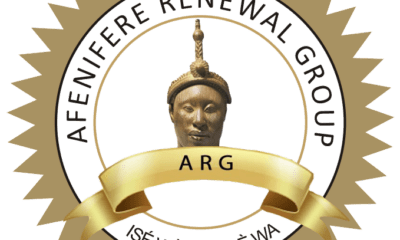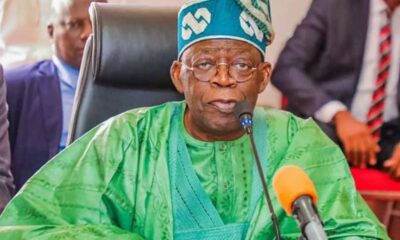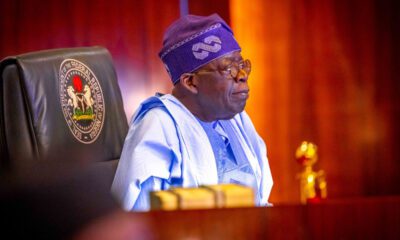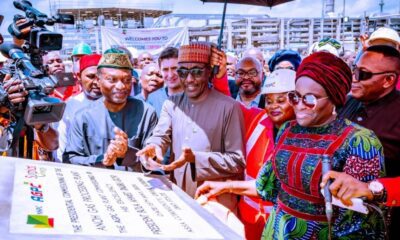Editorial
Nation in distress: The urgent need for economic and security relief

Nation in distress: The urgent need for economic and security relieAs the one-year anniversary of President Tinubu’s inauguration approaches, the nation is gripped by an unprecedented economic crisis, leaving a trail of hardship and anger in its wake.
Recall that protests have erupted in Minna, Kano, and Ondo, as it became clear that the rising cost of living in Nigeria reached a boiling point. Angry youths and women took to the streets, calling on the Tinubu administration to address the pressing issue of hunger and economic hardship.
The Northern wing of the Christian Association of Nigeria (CAN) has also joined the chorus, urging the federal government to take immediate action to alleviate the suffering of ordinary Nigerians.
The high cost of foodstuff, transportation, goods, and services has made life unbearable for many. The escalating insecurity, marked by rampant killings and kidnapping for ransom, has only compounded the problem. The economy is in distress, and the security situation is dire.
The removal of subsidies on petroleum products last May sparked a chain reaction of price hikes, with petrol prices skyrocketing by nearly 300 percent.
The ripple effect has been devastating, with the prices of essential items soaring to unimaginable heights. Companies are passing on transportation and energy costs to consumers, exacerbating the scourge of hunger and deprivation.
Youth frustration is boiling over, fueled by the difficulties brought on by President Tinubu’s policies, including the controversial floating of the Nigerian currency. The once-simmering pot of discontent has reached a boiling point, with protests and demonstrations erupting across the nation.
As the hunger crisis deepens, Nigerians are crying out for relief. The government must act swiftly to address the economic woes and restore hope to a desperate citizenry.
The clock is ticking, and the nation waits with bated breath for a solution to this avoidable crisis. Will the government heed the call and rescue Nigerians from the clutches of hunger and despair? Only time will tell.
Meanwhile, The Sultan of Sokoto, Alhaji Muhammadu Abubakar III, and the Jama’atu Nasril Islam (JNI) have sounded the alarm, urging governments to intervene in the worsening economic hardship that has pushed Nigerians to the brink.
The removal of subsidies on petroleum products last May sparked a chain reaction of price hikes, with petrol prices skyrocketing by nearly 300 percent.
The consequences of the government’s policies have been swift and brutal, with inflation spiraling out of control and wreaking havoc on the Nigerian people. Basic food prices have skyrocketed, with staples like rice, beans, maize, plantain, and tomatoes increasing by a staggering 25.34 percent to 40.01 percent as of March 2024.
To add insult to injury, the government has hiked electricity tariffs by a whopping 603 percent to N225 per kilowatt, despite the abysmal power generation that fluctuates between 2,500 and 4,000mw. This has led to the collapse of numerous small businesses, exacerbating the economic hardship.
The current economic situation, poverty level, removal of fuel subsidies, and galloping food inflation have created a perfect storm that threatens the very existence of the average Nigerian. The biting economic hardship has pushed many Nigerians, especially the youth, to the brink of desperation, with many seeking to flee the country in search of better opportunities abroad.
The situation is dire, and the government must take immediate action to address the economic crisis, restore hope to the people, and prevent a looming catastrophe. The clock is ticking, and the nation waits with bated breath for a solution to this avoidable crisis.
A recent poll conducted by NOIPolls in August 2023 revealed a staggering 63 percent of adult Nigerians are eager to leave the country in search of better opportunities.
The survey found that 73 percent of youths aged 18-35 are leading the charge, driven primarily by the quest for economic prosperity (60 percent) and education (32 percent). Insecurity, though a smaller concern, still motivates 3 percent to seek refuge abroad.
As Nigeria grapples with the triple threats of hunger, insecurity, and dwindling purchasing power, the streets have become a hotbed of kidnapping, terrorism, and banditry.
The value of the naira continues to plummet, eroding the purchasing power of ordinary citizens. With no respite in sight, the nation teeters on the brink of collapse.
The government must act swiftly to address the economic and security crises ravaging the country. The mass exodus of youths, Nigeria’s future, is a ticking time bomb that demands immediate attention.
Urgent steps are needed to revitalize the economy, ensure security, and restore hope to a desperate citizenry. The clock is ticking, and the nation waits with bated breath for a solution to this avoidable crisis.
Furthermore, 25 percent of Nigerians implored the government to rein in inflation, which has eroded their purchasing power. Others called for better working conditions (14 percent), improved citizen welfare (11 percent), and enhanced healthcare services, economic stability, and electricity supply (12 percent). These pleas echo the frustrations of a nation yearning for basic necessities and a decent standard of living.
The government must heed these urgent calls and prioritise the welfare of its citizens. By addressing these fundamental issues, Nigeria can stem the tide of migration and create a more prosperous and secure future for its people. The time for action is now.
It is time for the federal government to take concrete steps to stimulate economic growth, create jobs, and reduce the cost of living. It is also imperative to tackle the security situation head-on, ensuring that citizens are safe and secure in their daily lives.
The suffering of Nigerians is real, and it is the responsibility of the government to alleviate it.
We urge the Tinubu administration to heed the calls for help and take decisive action to address the economic and security challenges facing the nation. The time for action is now.
Editorial
Nigerians groan under high cost of living
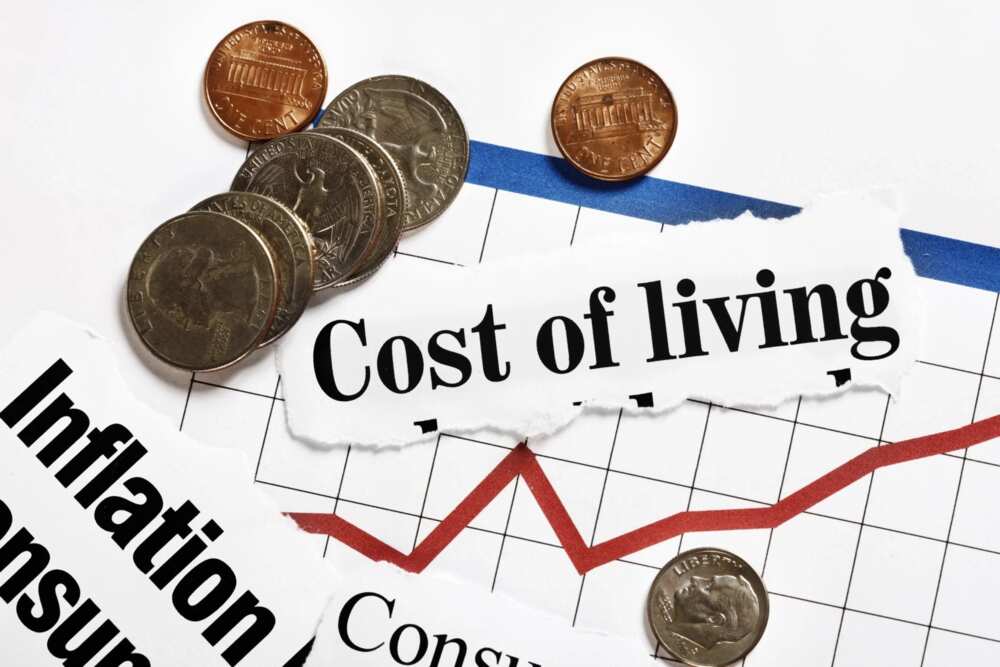

Barely fourteen days to the first year anniversary of this federal government, Nigerians have continued to groan under high cost of living, amidst a catalogue of failed promises. Despite its chants of ‘Renewed Hope Agenda,’ a cup of garri/rice has since gone out of the reach of an average Nigerian. There is a continuous hike in fuel and other petroleum products. Transportation fares, local, inter-state or international are a no-go area. Nigerians have lost count of pledged dates for the commencement of operations or production of our refineries, especially Port Harcourt Refinery.
Most citizens have lost hope in the current political leadership in the country. Fuel today is being sold at between N800 to N950 per litre and still counting. A bottle of kerosene is about N2,000 and this an essential product being used by almost 90 percent of the population, especially the lower cadre. In the past, the colour of kerosene used to be like spring water from a rock, but today the product is sullied with impurities, its colour of kerosene almost like that of groundnut oil. Yet, it remains scarce and costly. What a country.
Nigeria is possibly the only country with abundant crude oil deposits that prefers to throw away the crude at giveaway price to other countries in the name of exportation, only to buy the refined products from the crude at exorbitant prices, in the name of importation. The first refinery in Port Harcourt was built about nine years after oil was discovered in commercial quantity in Oloibiri in 1956 in the present day Bayelsa State. And up till today there is no intentional attempt to rebuild it, or be religious in maintaining it.
The Naira debuted as the national currency of Nigeria, at 75K to $1, but today N1,500 is exchanging $1. Yet, we are ranked among the highest producers of oil and gas in the comity of nations. The unadulterated truth is this: Nigerians are suffering in the midst of plenty which should not be the case.
The poor leadership of the old brigade, who have held sway since independence, should leave the stage for younger generation. The current President of France, Emmanuel Macro is below forty years. The recent election in Senegal produced a 44-year-old man as president. Whether we like it or not, once a person passes retirement age of 60, his mental faculty starts dropping.
Inflation rate is now 33-35% in the country. Unemployment rate is soaring and the Federal Government had the gut to propose N48,000 as minimum wage for Nigerian workers, possibly as part of the ‘renewed hope agenda.’ This is as against N860,000 being proposed by the organised labour, comprising the Nigeria Labour Congress (NLC) and Trade Union Congress(TUC).
We are not surprised therefore when the organised labour walked out of the negotiation table and handed down a 14-day ultimatum to the Federal Government to think right.
We hope the federal government will really do all it needs to do to avoid another showdown with Nigerian workers who are like wounded lions and have been patient enough with the economic torture currently being experienced by workers in the country. We hope and pray that the tail of a sleeping tiger, will not be unnecessarily pulled. It could amount to unpleasant consequences. The government should fulfil its campaign promises and ensure peace and tranquility throughout the nation.
Editorial
Minimum wage Saga: FG, let the people go…


For years, the narrative has been the same — the economy withers and the common man cries out for reprieve, only to be met with an endless array of impediments. When it is time to intercede for the poor, Nigerians are met with pointless bureaucracy and palliatives. Foreign aid is rendered ineffectual thanks to the gauze-hand of leaders, through which it all slips through into an oblivion of their own invention.
In April 2024, the headline inflation rate rose to 33.69 percent, up from 33.20 percent in March 2024, marking an increase of 0.49 percent points according to the Nigeria Bureau of Statistics (NBS). Yet, to raise the minimum wage to a level that will help beat back hunger in the poorest families has become a problem for the government.
Per the International Monetary Fund, IMF, a determined and well-sequenced implementation of government’s policy intentions would pave the way for faster, more inclusive, resilient growth in Nigeria. Without reforms — such as raising the minimum wage — to enhance the business environment, improve security, implement key governance measures, develop human capital, boost agricultural productivity, Nigeria’s growth potential will never leave the realm of imagination.
“These reforms are crucial to boost investor confidence, unlock Nigeria’s growth potential and diversify the economy, and address food insecurity, and underpin sustainable job creation,” IMF noted in its recent report, adding that over the last decade, limited reforms, security challenges, weak growth and now high inflation had worsened poverty and food insecurity in Nigeria.
“While Nigeria swiftly exited the COVID-19 recession, per-capita income has stagnated. Real Gross Domestic Product (GDP) growth slowed to 2.9 percent in 2023, with weak agriculture and trade, and in spite of the improvement in oil production and financial services.
“Growth is projected at 3.3 per cent for 2024 as both oil and agriculture outputs are expected to improve with better security. The financial sector has remained stable, in spite of heightened risks. Food insecurity could worsen with further adverse shocks to agriculture or global food prices. Adverse shocks to oil production or prices would hit growth, the fiscal and external position, and exacerbate inflationary and exchange rate pressures,” the IMF said.
Yet, on Wednesday the pattern continued. Negotiations reached a deadlock due to the government’s perceived unwillingness to engage in fair discussions with Nigerian workers. The NLC National President, Joe Ajaero, in a sense is right to say that the government’s proposal of N48,000 as the new minimum wage is an insult to Nigerian workers.
It is no surprise that the labour unions are demanding a higher minimum wage to reflect the current economic realities and alleviate the suffering of Nigerian workers. The stalemate in negotiations may lead to industrial action, which could have far-reaching consequences for the economy.
Many labour in vain for decades for peanuts, only to be denied their pensions in old age. Of course, the Nigerian worker will down his tools in the face of great poverty, and seeming apathy from the government. The relationship between wage rate and employment is well established. Most revolutions throughout the world are dependent on the satiation of the labour force. The Federal Government should maintain an atmosphere of charity and responsibility. Like the Israelite Moses said millennial ago, let our people go.
Editorial
Inflation as major threat to life security
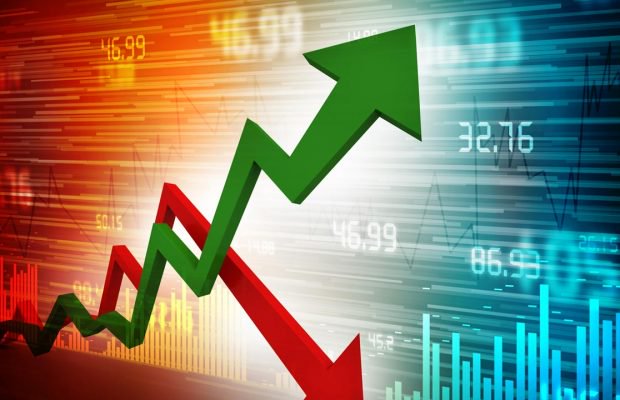

Millions of Nigerians are groaning because of the devastating inflationary pressure that is making it impossible for many to consume the minimum calories required for a healthy living.
It is known that Nigeria’s macroeconomic environment has become very harsh in its diminutive impact on the purchasing power at the disposal of the citizenry.
Many cannot also conveniently afford to transport themselves to their workplace or move around for routine activities.
Meanwhile, the price of other payment obligations for services such as house rents, school fees, utilities (including cable television), health and recreation services are rising on a daily basis.
This shows that the quality of life enjoyed by Nigerians is deteriorating as poverty becomes more pervasive and endemic.
According to official statistics, the November inflation rate was 14.89 percent and it is fast heading towards the 15 percent mark.
Meanwhile, the Rural inflationary pressure is also climbing as the rate climbed to 12.28 percent in July even when the price of Premium Motor Spirit and electricity tariff had not been hiked. Prices are just rising freely.
This applies to production inputs (except labour), consumer durable, agricultural products as well as services.
This unfortunately is the case irrespective of the basket of goods one uses as a measure outside the standard yardstick.
A close look at the policy framework of the government shows that the recent surge in general price level is not unconnected with structural bottlenecks, fiscal and monetary policies, deregulation, and trade policies as well as inefficiency on the part of regulatory agencies.
The government has for too long paid lip service towards unbundling of the shackles of growth and development such as poor budgetary implementation on capital projects, outdated laws and a toxic business environment that constrain the economy.
This has indeed, slowed down economic growth and resulted in shortage of goods and services and their attendant impact on inflation.
The government seems to be heating up the system by keeping its spending open-ended even as it cries of inadequacy of revenue to finance its expenditure obligations.
The disconnect between recurrent account, capital account and public debt operations is certainly having a destabilising effect on public finance operations of the country.
This has given rise to fiscal domination that describes the aggregative impact of the uncoordinated expenditure activities of all the governments in our strange three-tier federal arrangement.
It also appears that the Central Bank is losing sight of its inflation-targeting monetary policy which has been on its front burner for more than two decades now.
This is certainly not what the nation needs now when virtually all the macroeconomic variables are in disarray.
Here, attention of CBN must be called to its Naira management policy especially as it affects the regimented devaluation and depreciation which impact heavily on the domestic and external value of the currency.
The external value requires attention considering that the Nigerian economy carries a monolithic production base and import orientation.
The gross loss in the value of Naira is having a horrible impact on the life of Nigerians as misery and hopelessness characterise the daily songs of the lower income strata and whatever is left of the middle class.
It must be pointed out also that the government policy on agriculture in general and rice production appears to suffer a backlash.
Whereas local production has increased appreciably the farmers and agricultural marketers are engaging in exploitative pricing practice.
They simply jack up their prices arbitrarily. This is particularly the case with respect to rice where the price of the local varieties is at par with the foreign brands.
The recent increase in the price of premium motor spirit and electricity tariff have surely added more salt to the injury.
These two products are directly tied to production and distribution of goods and services and as such raising their individual prices simply translates to increasing the price of everything that is bought and sold in the open and underground economies.
Unfortunately, all these are happening when the nominal income of the average citizen has either stagnated or declined as the minimum wage has not been paid by many states of the federation.
The same is characterised by controversy in those states and some federal agencies that have implemented the new salary regime.
-
Finance4 months ago
Court orders Sen. Victor Umeh to repay N136m bank debt to AMCON
-



 Abuja Update3 months ago
Abuja Update3 months agoUNDP, FG partnership needed to achieve inclusion, equity- Minister
-
Abuja Update2 months ago
Banks drive stock market performance with N147bn gain
-
capital market2 years ago
Rt.briscoe, FBNH, Others halts negative performance of stock market
-
Submission Guidelines4 months ago
CALL FOR SUBMISSIONS: POETRY COLUMN-NND
-



 Health1 month ago
Health1 month agoCapacity training will reduce migration of health workers- NPHCDA
-



 Business4 weeks ago
Business4 weeks agoTingo Group unveils Tingo Electric, Tingo Cola drink at Lagos launch
-
News5 months ago
Oil thieves sponsoring malicious media campaign against Navy – Spokesman

